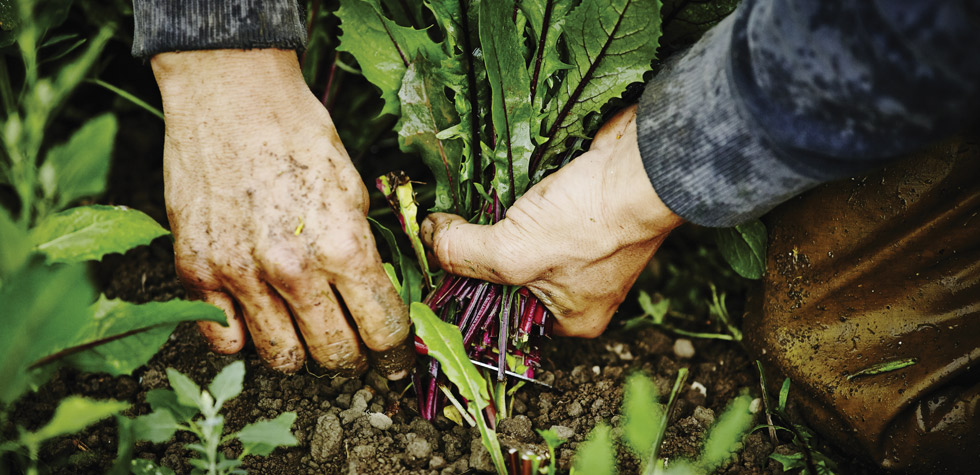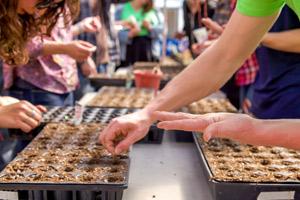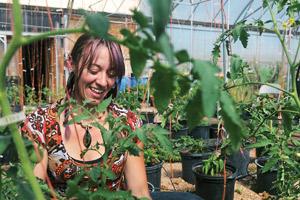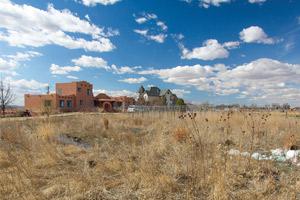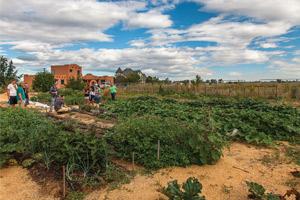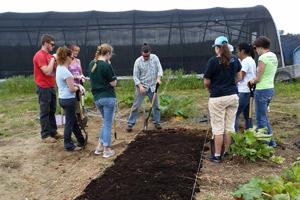UNC Environmental Studies students dig deep to bring local food to the community for the global good
By Debbie Pitner Moors
Do you know where your food’s been? The answer can be surprising. In some cases, your food may log more miles than a business-class traveler.
That carrot you’re adding to your salad may have traveled 1,800 miles before reaching the plate on your table. The distance food travels from source to market is called “food miles,” and it can vary widely. Grapes grown locally may be trucked 150 miles, compared to grapes that are transported 2,100 miles from another country.
So why do food miles matter? Not only does food grown and purchased locally support the regional economy, retain more nutrients and often provide richer flavor, but the environmental impact of getting food from farm to table can be significant. Fuel expended and carbon emitted create an environmental vapor trail with global implications.
At UNC, students, faculty and community members are developing resources that connect local farmers with the community and make buying local beneficial on many levels. In March, UNC was selected as one of 27 communities and programs nationally to receive support from the White House Rural Council’s “Local Food, Local Places” initiative. The initiative offers direct technical support and expertise to community partners, integrating local food systems into regional economic action plans. It’s one of a number of fortuitous connections that has spurred the program.
Putting Down Roots
Associate Professor Richard Jurin, Ph.D., has directed UNC’s Environmental Studies program since 2001, leading and advancing its cross-disciplinary focus on sustainability. In 2015, Kevin Cody arrived in Greeley from California, where he earned his Ph.D. in sociology at the University of California, Santa Cruz. Cody’s research focused on small-scale agricultural producers and the adaptability of sustainable agriculture to various social and cultural climates. Jurin offered him an opportunity to teach sustainability and urban farming last spring, and he and Jurin began to share a vision for expanding the program.
“We were talking about wouldn’t it be great to actually have space to develop a farm program,” Cody says.
The program has a 4,000 square-foot garden on campus, just west of Ross Hall, but Jurin and Cody knew that applying organic and sustainable farming methods on a larger scale would open up possibilities not available with the campus garden.
As they were conjuring images of a farm, they were approached by Kirsten Daniels, owner of WiseAcres Farms in Greeley. She offered to lease three-fourths of an acre of land and a 5,000 square-foot heated greenhouse for the program. There were also about 11 acres available for field crops. The farm’s location and layout were just what the program needed to grow. With financial support from the student-administered Leadership for Environmental Action Fund (LEAF), the farm went from pipe dream to reality.
Producing Ideas
Last spring and through the summer, Cody and 10 students in the Urban Agriculture
class worked at WiseAcres. Students planned, grew and tended produce that ranged from
tomatoes to pumpkins. They harvested and marketed their produce, selling it at farmers
markets and through departments on campus. They also learned some hard lessons.
“There were quite a number of unintentional learning opportunities,” Cody says. “We
had a very wet spring, and students learned that it breaks down soil structure if
you turn the soil when it’s wet.”
An infestation of thrips — small bugs that can pass along disease — introduced students to the use of biological pest control when thrips brought spotted wilt virus to the farm and decimated their tomato crop. Economic realities of the supply chain also challenged students to think entrepreneurially. While they had fresh, local, organically grown produce, they began to realize the difficulties of getting food to consumers.
Ellen Harris, a junior Environmental and Sustainability Studies major with minors in Economics and History, says that experience gave her an idea for her honors research project.
“After a frustrating summer of great produce production but few outlets for it, I knew that I wanted to help support the student farm by making it more integrated with the university and the community,” Harris says. “I came to the conclusion that getting the student farm’s produce into the dining halls might benefit the farm and the university.”
Harris started her research project, focused on farm-to-institution food systems, by looking at the benefits of local agriculture for the university and the larger community and school district involvement with local agriculture.
“When I get farther into my research, I plan on directly contacting school districts and other universities with student farms and/or local provisioning to find out how they have that system set up, with the hope of using that information to apply to UNC,” she says.
UNC Executive Chef Aran Essig adds, “Discussions between Environmental Studies and UNC’s Dining Services are exploring types of produce that can be grown for use in the dining rooms. It’s a great opportunity to support the program’s student learning objectives and see the full cycle from planning, planting, and harvest to service in the dining rooms. We’re very excited to be part of the process and literally see it grow.”
Composting completes the cycle, which brings 2015 grad Geoff Schmidt to the mix. While still enrolled at UNC, Schmidt founded Common Good Compost, a food-waste recycling company serving Greeley and surrounding communities.
“We collect and compost our customers’ food waste and return it for them to use in their gardens. We recently negotiated a contract with Holmes Dining Hall, which generates an estimated 2.5 tons of food waste every week,” Schmidt says.
Schmidt’s company will set up its base of operations at WiseAcres, returning a portion of the compost to the farm.
“Geoff’s project illustrates how the (WiseAcres) site can be a springboard for entrepreneurial activity for students,” Cody notes.
Schmidt was also instrumental in setting up two beehives on campus in 2015. Cody says there are plans to expand beekeeping opportunities at the farm, creating cross-disciplinary learning and helping pollinators. That interconnectedness is all part of urban farming and sustainable agriculture.
Into the Community
As Cody and Jurin began to look for grants and funding to support the ENST farm project, they learned about the White House initiative. The “Local Food, Local Places” program offers technical assistance and expertise to communities studying local food systems in relation to regional economic plans. Deborah Romero, director of UNC’s Office of Community and Civic Engagement, helped the UNC team create the proposal in collaboration with the Greeley community and local school district.
As they developed the proposal, Cody says, “A couple of things became clear; one was
the need to address some of the food issues and quality of nutrition.”
Their plan proposed partnerships with the city of Greeley, downtown businesses and
community organizations to connect existing food-related health and well-being programs
and improve access to healthy local food.
On Jan. 25, U.S. Secretary of Agriculture Tom Vilsack named UNC as one of 27 programs chosen for the initiative, selected from more than 300 communities that applied. UNC’s project will work to provide area residents with more options for eating healthy, locally-grown produce and eliminate area food deserts — one of the issues identified as a challenge in the region.
When a major grocery store closed in Greeley, a portion of the community found themselves in a food desert, without close access to fresh food. Two local farmers opened a store near campus called The Farmer’s Pantry, which provides an outlet for local farmers who want to sell their produce.
“The Farmer’s Pantry is a good example of what we want to be able to support through the initiative,” says Cody. “We hope to offer a wide perspective on agriculture and build on Greeley’s agrarian history.”
With a farm providing growing space both literally and figuratively, the potential — for students, the community and the farm itself — is perennial.
“This project is definitely a win-win-win situation,” Cody says. “UNC students will be provided with opportunities for hands-on learning and community engagement, residents will have more options for eating healthy and locally-grown produce, and existing health and well-being initiatives in Greeley will be better integrated.”
Sustainable UNC
UNC has had an environmental studies program for nearly 45 years and is uniquely positioned to offer a cross-disciplinary approach to sustainability. Coupling UNC’s size with being in the heart of an agricultural community, the program accommodates customized learning.
“(Our size) gives us a flexibility that allows greater advantages as an interdisciplinary program,” Cody says. UNC’s environmental studies program offers possibilities for students in a broad range of majors, including dietetics, nutrition, business, marketing, biology, education and journalism.
“Food systems is a growing field of study because it cuts across so many different programs, so we’re developing a sustainable food systems minor. We’re also looking at the possibility of developing community supported agriculture with the farm, and may grow hops in the future — which could tie in with UNC’s brewing science program,” Cody says.
There are many UNC entities that interconnect with the ENST program and UNC’s efforts toward sustainability:
- Student LEAF is a student-managed, -funded and -led program at UNC that has provided funding and leadership for a number of projects on campus, from recycling bins to beehives.
- Office for Community and Civic Engagement has helped connect university and community efforts and partnerships.
- Dining Services has long been a campus leader for sustainable practices such as composting, local food, biodegradable cups, plates and utensils, and food-waste reduction.
- Information Management and Technology focuses on energy and resource conservation.
- Facilities Management and On-campus Initiatives, like green building practices, recycling programs, and landscaping and water-saving programs put into practice by students, faculty and staff to reduce UNC’s energy and waste footprint.

